各单元语法复习
人教版七年级下册英语期末复习:Unit 7-Unit 12 各单元语法知识点复习提纲(全面!)
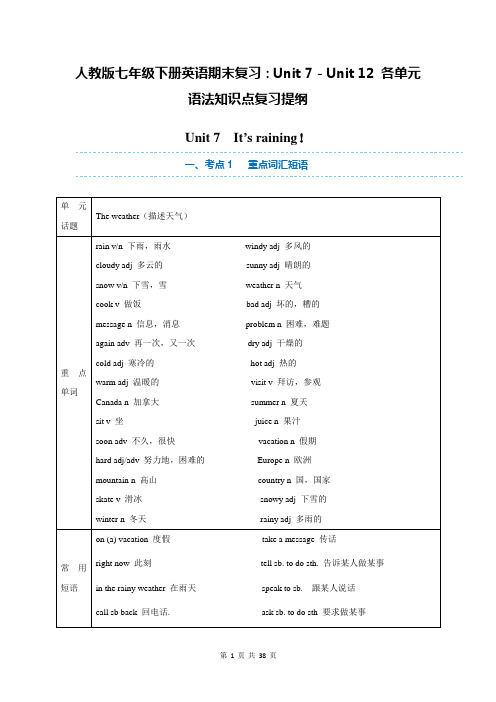
人教版七年级下册英语期末复习:Unit 7-Unit 12 各单元语法知识点复习提纲Unit 7 It’s raining!一、考点1 重点词汇短语1 messagemessage为可数名词,意为“消息,信息”,take a message for sb.“为某人捎个口信”。
拓展:give sb. a message 捎信给某人,leave a message 留口信,get the message 明白对方的意思。
Can I take a message for him?当某人发现要找的人不在或接电话的人发现打电话者要找的人不在时,常用此语2 could 情态动词意为“能,可以“,表示请求许可,在语气上比can委婉客气,但这种句式的肯定回答用can。
Could you just tell him to call me back?3 call及物动词,意为“打电话给”。
call sb. (up) “打电话给某人”,call sb. at +电话号码,意为“拨打……找某人”。
拓展:call 是一个多义词,call sb 可表示“叫醒某人,呼唤某人”;give sb. a call 给某人打电话。
4 back副词“回来,回原处,向后”;call sb. back给某人回个电话。
【即学即练】I’ll _____you _____.我将给你回电话。
5 visit此处用作及物动词,意为“拜访,探望”,后接表示人的名词或代词。
visit还可意为“参观,游览”,后接表示地点的名词。
拓展:visit还可用作可数名词,意为“访问,参观,拜访。
be on a visit to ... “正在访问/参观……”。
visitor参观者,游览者,游客。
I’m having a great time visiting my aunt in Canada._____ my grandparents every year at Christmas.我每年圣诞节都去探望我的祖父母。
七年级英语上新目标Unit1--12单元重点及语法总复习

初中七年级上语法总复习一.Be 动词(am, is, are)的用法口诀:I 用am , you 用are ,is 连着他(he)她(she)它(it)。
单数统统用is,复数一律都用are. 变疑问,往前提,句末问好莫丢弃,变否定,更容易,be 后not莫忘记,疑问否定任你变,句首大写莫迟疑。
注意:be 动词通常会和其他词连写在一起,如:I’m , what’s ,name’s, they’re等。
I ________ a student.You ________ Janpanese.He _______ my brother.She_______ very nice.My name ________Harry.I _______ 10 years old.Lilei _________ very tall. Mary, this _________ Tom.Miss Zhou ________ my teacher. What_____ this? The cat________ black.This book________ very interesting. Lilei and I __________ good friends. These ________ apples.Those_________ bananas.They _________students.________ she from China?________ you good at English? The books ________ on the desk.I ______ a boy. ______ you a boy? No, I _____ not.The girl______ Jack's sister.The dog _______ tall and fat.The man with big eyes _______ a teacher. ______ your brother in the classroom? Where _____ your mother?She ______ at home.How _______ your father.Mike and Liu Tao ______ at school. Whose dress ______ this?Whose socks ______ they?That ______ my red skirt.Who ______ I?The jeans ______ on the desk.Here ______many oranges for you. Here ______ some sweaters for you.The black pants ______ for Su Yang. This pair of boots ______ for Yang Ling. There some milk for me.Some tea ______ in the glass.Gao shan's shirt _______ over there.My sister's name ______Nancy.This ______ not Wang Fang's pencil.______ David and Helen from England? There ______ a girl in the room.There ______ some apples on the tree._______ there any kites in the classroom? _______ there any apple juice in the bottle? There _______ some bread on the plate.There _______ a boy, two girls, three men and ten women in the park.You, he and I ______ from China. My telephone number________8563-0770.1.通常情况下,人称代词的主格在句子中作主语。
单元语法专题复习(动词不定式作定语和结果状语)(解析版)
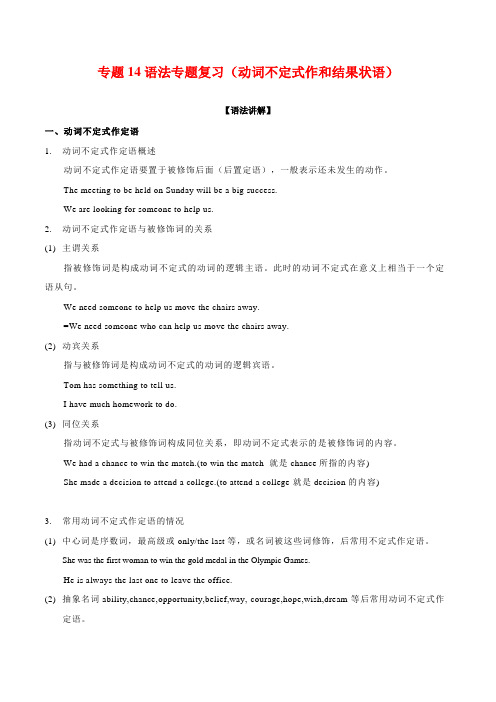
专题14语法专题复习(动词不定式作和结果状语)【语法讲解】一、动词不定式作定语1.动词不定式作定语概述动词不定式作定语要置于被修饰后面(后置定语),一般表示还未发生的动作。
The meeting to be held on Sunday will be a big success.We are looking for someone to help us.2.动词不定式作定语与被修饰词的关系(1)主谓关系指被修饰词是构成动词不定式的动词的逻辑主语。
此时的动词不定式在意义上相当于一个定语从句。
We need someone to help us move the chairs away.=We need someone who can help us move the chairs away.(2)动宾关系指与被修饰词是构成动词不定式的动词的逻辑宾语。
Tom has something to tell us.I have much homework to do.(3)同位关系指动词不定式与被修饰词构成同位关系,即动词不定式表示的是被修饰词的内容。
We had a chance to win the match.(to win the match 就是chance所指的内容)She made a decision to attend a college.(to attend a college就是decision的内容)3.常用动词不定式作定语的情况(1)中心词是序数词,最高级或only/the last等,或名词被这些词修饰,后常用不定式作定语。
She was the first woman to win the gold medal in the Olympic Games.He is always the last one to leave the office.(2)抽象名词ability,chance,opportunity,belief,way, courage,hope,wish,dream等后常用动词不定式作定语。
新概念第二册各单元的语法要点归纳

新概念第二册各单元的语法要点归纳第一单元 - 学外语的好处- 句型:It is (not) + 形容词 + (for somebody) + to do something - 示例:It is important for us to learn a foreign language.- 句型:It is said/believed/thought/reported that ...- 示例:It is reported that English is spoken all over the world.第二单元 - 生活在一个大城市- 句型:There be + 名词(单数/复数)+ (地点)- 示例:There is a park near my house.- 句型:What color/size/shape + be + 主语?- 示例:What color is your car?第三单元 - 海底勘探- 句型:现在进行时(be动词 + 动词ing)- 示例:They are looking for oil under the sea.- 句型:需要/应该/可以/能够 + 动词原型- 示例:We can use machines to explore the ocean floor.第四单元 - 名人的生活- 句型:情态动词 + 动词原型- 示例:She can sing very well.- 句型:主语 + be + 形容词 + to do something- 示例:Be patient to wait for your turn.第五单元 - 健康与健身- 句型:情态动词 + 动词原型- 示例:You should exercise regularly.- 句型:主语 + need(s) + to do something- 示例:We need to eat a balanced diet.第六单元 - 书信写作- 句型:谓语动词 + 宾语 + 动词-ing- 示例:I enjoy reading books.- 句型:It is + adj. + of + somebody + to do something - 示例:It is kind of you to help me.第七单元 - 未来生活- 句型:将来时态(will/shall + 动词原型)- 示例:We will have robots to do household chores.- 句型:It is + adj. + that + 从句- 示例:It is certain that technology will change our lives.第八单元 - 代购- 句型:情态动词 + be + adj. + to do something- 示例:I must be careful not to buy counterfeit products. - 句型:主语 + be + 形容词 + of + 宾语- 示例:The article is full of useful information.第九单元 - 旅游- 句型:现在完成时态(have/has + 过去分词)- 示例:I have visited many cities in Europe.- 句型:It is + adj./adv. + that + 从句- 示例:It is true that travel broadens the mind.。
人教版八年级英语(上册)各单元语法梳理

人教版八年级英语(上册)各单元语法梳理Unit 1Where did you go on vacation?第一单元的语法重点是复合不定代词。
复合不定代词是指由some-, any-, no-, every- 与-thing, -one, -body 等构成的不定代词。
常见的复合不定代词有:【注意】:在使用复合不定代词时,要注意以下几点:1.带 some的复合不定代词通常用于肯定句中,而带any的复合不定代词通常用于否定句或疑问句中。
如:●I can’t see anything on the table. 我在桌子上什么也看不到。
●—Is there anyone in the classroom? 教室里有人吗?—Yes. There is someone. 是的,有人。
2.在表示请求、提建议等带有委婉语气的疑问句和希望得到对方肯定答复的疑问句中,也用带some的复合不定代词。
如:●Would you like something to drink? 你想要喝点什么吗?●Why not ask someone to go with you? 为什么不叫人和你一起去呢?3.形容词修饰复合不定代词时,要放在复合不定代词的后面。
如:There's nothing serious. 没什么要紧的。
4.复合不定代词作主语时,谓语动词通常用单数形式。
如:Someone is waiting for you .有人正在等你。
【记忆口诀】:复合代词美名扬,修饰成分后边藏;如果它来作主语,谓语动词用单数。
Unit 2How often do you exercise?第二单元我们要学习的重点语法是频度副词。
频度副词是副词家族的一个分支,用来表示动作发生的频率。
常见的频度副词有:【例句展示】:1. She is always glad to help others. 她总是乐于助人。
2. My mother usually gets up at six. 我妈妈通常6 点起床。
人教版高中英语各单元语法点汇总
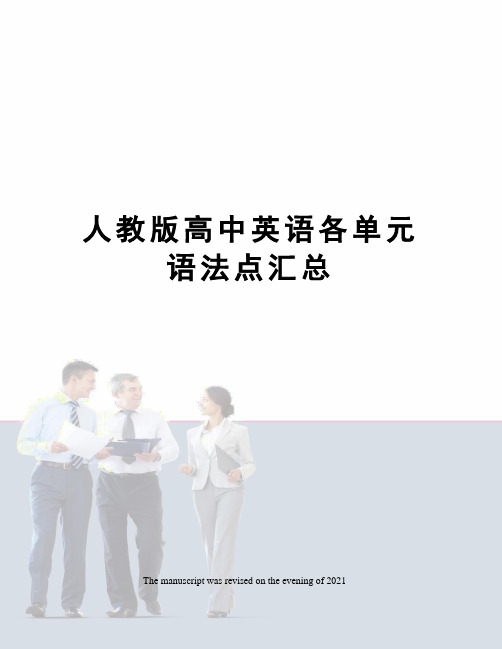
语态:现在完成时的被动语态
Unit 4
语态:现在进行时的被动语态
Unit 5
定语从句4:介词+which/whom
单元
语法点
必修三
Unit 1
情态动词1: may/might/,can/could,will/would,shall/should,must/can’t
Unit 2
情态动词2:oughtto/oughtnotto/haveto/don’thaveto/mustn’t/needn’t
人教版高中英语各单元语法点汇总
单元
语法点
必修一
Unit 1 Friendship
直接引语间接引语1:陈述句和疑问句
Unit 2 English around the world
直接引语间接引语2:请求和命令
Unit 3 Travel journal
时态:现在进行时表将来
Unit 4 Eaபைடு நூலகம்thquakes
Unit 3
名词性从句1:作为宾语和表语
Unit 4
名词性从句2:作为主语
Unit 5
名词性从句3:作为同位语
单元
语法点
必修四
Unit 1
主谓一致
Unit 2
非谓语动词:ing形式作主语和宾语
Unit 3
非谓语动词:ing形式作表语、定语和宾语补足语
Unit 4
非谓语动词:ing形式作定语和状语
Unit 5
Unit 5
复习非限制性定语从句
单元
语法点
选修八
Unit 1
复习名词性从句:作为主语、宾语和表语
Unit 2
复习单词、短语和从句作同位语
牛津译林版八年级上册8A英语期末复习各单元语法知识点提纲
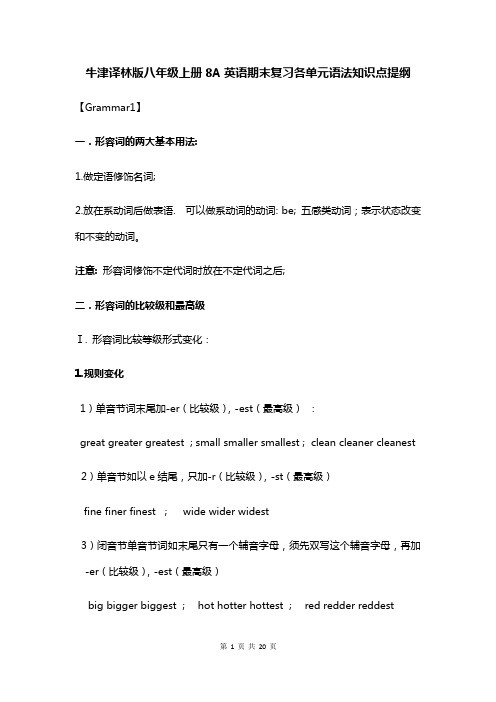
牛津译林版八年级上册8A英语期末复习各单元语法知识点提纲【Grammar1】一.形容词的两大基本用法:1.做定语修饰名词;2.放在系动词后做表语. 可以做系动词的动词: be; 五感类动词;表示状态改变和不变的动词。
注意:形容词修饰不定代词时放在不定代词之后;二.形容词的比较级和最高级Ⅰ. 形容词比较等级形式变化:1.规则变化1)单音节词末尾加-er(比较级),-est(最高级) :great greater greatest ; small smaller smallest ; clean cleaner cleanest 2)单音节如以e结尾,只加-r(比较级),-st(最高级)fine finer finest ; wide wider widest3)闭音节单音节词如末尾只有一个辅音字母,须先双写这个辅音字母,再加-er(比较级),-est(最高级)big bigger biggest ; hot hotter hottest ; red redder reddest4)以辅音字母+y结尾的词,则变y为-i,再加-er和-est。
easy easier easiest ; busy busier busiest5)部分双音节和多音节词在前面加单词more和most。
Careful more careful most carefulDifficult more difficult most difficult2.不规则变化good/well better best bad/ill worse worstmany/much more most little less leastfar farther/further farthest/furthest注:有些形容词一般没有比较等级。
如: right, wrong等。
三. 形容词比较级的用法:表示两者(人或物)的比较。
⒈表达“A大于B”用 A …比较级+than B①. Tom比我胖。
七年级上册各单元语法重点
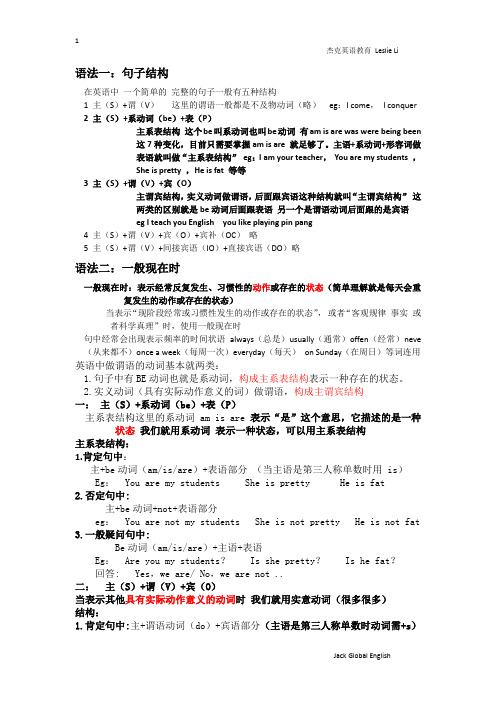
语法一:句子结构在英语中一个简单的完整的句子一般有五种结构1 主(S)+谓(V)这里的谓语一般都是不及物动词(略)eg:I come,I conquer2 主(S)+系动词(be)+表(P)主系表结构这个be叫系动词也叫be动词有am is are was were being been这7种变化,目前只需要掌握am is are 就足够了。
主语+系动词+形容词做表语就叫做“主系表结构”eg:I am your teacher,You are my students ,She is pretty ,He is fat 等等3 主(S)+谓(V)+宾(O)主谓宾结构,实义动词做谓语,后面跟宾语这种结构就叫“主谓宾结构”这两类的区别就是be动词后面跟表语另一个是谓语动词后面跟的是宾语eg I teach you English you like playing pin pang4 主(S)+谓(V)+宾(O)+宾补(OC)略5 主(S)+谓(V)+间接宾语(IO)+直接宾语(DO)略语法二:一般现在时一般现在时:表示经常反复发生、习惯性的动作或存在的状态(简单理解就是每天会重复发生的动作或存在的状态)当表示“现阶段经常或习惯性发生的动作或存在的状态”,或者“客观规律事实或者科学真理”时,使用一般现在时句中经常会出现表示频率的时间状语always(总是)usually(通常)offen(经常)neve (从来都不)once a week(每周一次)everyday(每天)on Sunday(在周日)等词连用英语中做谓语的动词基本就两类:1.句子中有BE动词也就是系动词,构成主系表结构表示一种存在的状态。
2.实义动词(具有实际动作意义的词)做谓语,构成主谓宾结构一:主(S)+系动词(be)+表(P)主系表结构这里的系动词am is are 表示“是”这个意思,它描述的是一种状态我们就用系动词表示一种状态,可以用主系表结构主系表结构:1.肯定句中:主+be动词(am/is/are)+表语部分(当主语是第三人称单数时用 is)Eg: You are my students She is pretty He is fat2.否定句中:主+be动词+not+表语部分eg: You are not my students She is not pretty He is not fat 3.一般疑问句中:Be动词(am/is/are)+主语+表语Eg: Are you my students? Is she pretty? Is he fat?回答: Yes,we are/ No,we are not ..二:主(S)+谓(V)+宾(O)当表示其他具有实际动作意义的动词时我们就用实意动词(很多很多)结构:1.肯定句中:主+谓语动词(do)+宾语部分(主语是第三人称单数时动词需+s)肯定句:you have a baseball / they have a baseball /she has a baseball 2.否定句中:主+do not+谓语动词原形+宾语部分单三人称做主语时+does not否定句:you do not have a .../they do not have a .../she does not have ..3.一般疑问句:Do(实意动词)+主语+动词原形+其他注:(单三人称做主语时用Does+主+动词原形+其他)一般疑问句:do you have a ..?/ Do they have a ...?/Does he/she have a ... 单三人称做主语包括:he/she/it that/this/名字/人称谓,职务等单三人称做主语时谓语动词必须加“s”规则如下1 一般的直接在动词后加s2 以s x ch sh o 结尾的动词加es3 以辅音字母加y结尾的动词,变y为i再加es看见am is are的句子那么肯定是一般现在时而且是主系表的结构用来描述存在的状态,句子中没有am is are则是实意动词做谓语的主谓宾结构用来描述具体有实际意义的动作语法三:代词用来代替名词和形容词起指示作用的词就叫代词分类:人称代词物主代词反身代词指示代词疑问代词不定代词等等主要学习人称代词物主代词人称代词就是指表示我(们)你(们)它(们)这些词有数(单数复数)和格(主格宾格)的变化物主代词就是指表示我(们)的,你(们)的,它他她(们)的,表示某人某物归属于谁谁所有的这些词(所属关系),有形容词性物主代词和名词性物主代词之分。
人教版九年级上册英语各单元语法重点梳理
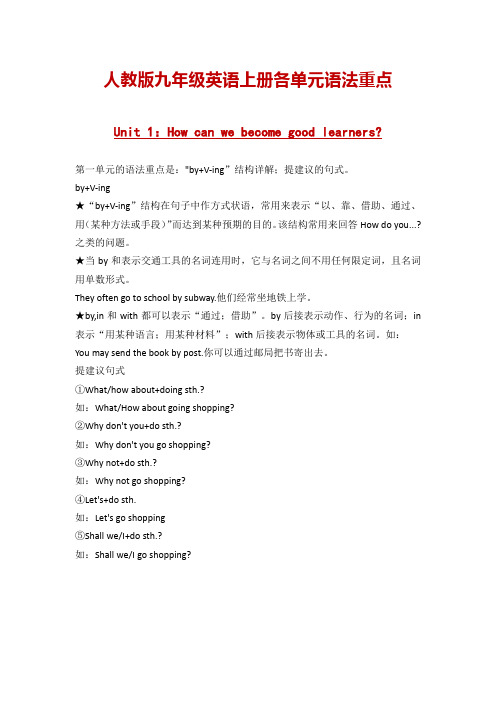
人教版九年级英语上册各单元语法重点Unit 1:How can we become good learners?第一单元的语法重点是:"by+V-ing”结构详解;提建议的句式。
by+V-ing★“by+V-ing”结构在句子中作方式状语,常用来表示“以、靠、借助、通过、用(某种方法或手段)”而达到某种预期的目的。
该结构常用来回答How do you...?之类的问题。
★当by和表示交通工具的名词连用时,它与名词之间不用任何限定词,且名词用单数形式。
They often go to school by subway.他们经常坐地铁上学。
★by,in和with都可以表示“通过;借助”。
by后接表示动作、行为的名词;in 表示“用某种语言;用某种材料”;with后接表示物体或工具的名词。
如:You may send the book by post.你可以通过邮局把书寄出去。
提建议句式①What/how about+doing sth.?如:What/How about going shopping?②Why don't you+do sth.?如:Why don't you go shopping?③Why not+do sth.?如:Why not go shopping?④Let's+do sth.如:Let's go shopping⑤Shall we/I+do sth.?如:Shall we/I go shopping?Unit 2:I think that mooncakes are delicious!第二单元的语法重点是:宾语从句;反义疑问句;表达“花费”。
宾语从句that,if和whatever引导的宾语从句:★宾语从句中连接词的选择1.由that引导的宾语从句:that在从句中无词义,不作任何成分,常可省略。
如:Jenny said(that)she could finish her painting before supper.I think(that)you are right.2.由if或whether引导的宾语从句:if或whether引导宾语从句时,一般可通用,都表示“是否”。
人教版高中英语各单元语法点汇总

语法点
必修一
Unit 1 Friendship
直接引语间接引语1:陈述句和疑问句
Unit 2 English around the world
直接引语间接引语2:请求和命令
Unit 3 Travel journal
时态:现在进行时表将来
Unit 4 Earthquakes
定语从句1:that, which, whom, whose
Unit 3
名词性从句1:作为宾语和表语
Unit 4
名词性从句2:作为主语
Unit 5
名词性从句3:作为同位语
单元
语法点
必修四
Unit 1
主谓一致
Unit 2
非谓语动词:ing形式作主语和宾语
Unit 3
非谓语动词:ing形式作表语、定语和宾语补足语
Unit 4
非谓语动词:ing形式作定语和状语
Unit 5
Unit 5 Nelson Mandela—a modern hero
定语从句2:when, where, why,介词+which/whom
单元
语法点
必修二
Unit 1
定语从句3:限制性定语从句和非限制性定语从句
Unit 2
语态:一般将来时的被动语态
Unit 3
语态:现在完成时的被动语态
Unit 4
Unit 2
虚拟语气2: If I had done…,I would have done…
Unit 3
It的特殊用法(1)
Unit 4
It的特殊用法(2)
Unit 5
复习ing形式
单元
语法点
选修七
高一英语各单元语法归纳

高一英语各单元语法归纳Unit 1: Present Tense1. Simple Present Tense (一般现在时)- Used to express general truths, habits, and permanent situations.- Formed by adding 's' or 'es' to the base verb in the third person singular, and with the base verb for all other pronouns.- Examples: She plays the guitar every day. They work in a bank.2. Present Continuous Tense (现在进行时)- Used to talk about actions happening at the moment of speaking.- Formed with the present tense of 'be' (am/is/are) + the present participle (-ing form) of the verb.- Examples: He is studying for his exams right now. They are playing football in the park.3. Present Perfect Tense (现在完成时)- Used to talk about past actions that have a connection to the present.- Formed with the present tense of 'have' (have/has) + the past participle of the verb.- Examples: I have already finished my homework. She has visited London many times.4. Present Perfect Continuous Tense (现在完成进行时)- Used to talk about an action that started in the past, continues in the present, and may still continue in the future.- Formed with the present perfect tense of 'be' (have/has been) + the present participle (-ing form) of the verb.- Examples: We have been studying English for two hours. He has been working on this project since morning.Unit 2: Past Tense1. Simple Past Tense (简单过去时)- Used to talk about finished actions in the past.- Formed by adding 'ed' to the base verb, and with an irregular verb, by using its past form.- Examples: I played soccer yesterday. They went to the cinema last night.2. Past Continuous Tense (过去进行时)- Used to talk about an action that was in progress in the past.- Formed with the past tense of 'be' (was/were) + the present participle (-ing form) of the verb.- Examples: She was watching TV when I called her. They were having dinner at 8 PM yesterday.3. Past Perfect Tense (过去完成时)- Used to talk about an action that happened before another action in the past.- Formed with the past tense of 'have' (had) + the past participle of the verb.- Examples: I had already eaten lunch when she arrived. He had finished the book before the movie started.4. Past Perfect Continuous Tense (过去完成进行时)- Used to talk about an ongoing action that happened before another action in the past.- Formed with the past perfect tense of 'be' (had been) + the present participle (-ing form) of the verb.- Examples: They had been studying French for four years before they moved to France. She had been waiting for the bus for half an hour when it finally arrived.Unit 3: Future Tense1. Simple Future Tense (一般将来时)- Used to talk about actions that will happen in the future.- Formed with 'will' or 'shall' + the base verb.- Examples: I will call you later. She shall arrive tomorrow.2. Future Continuous Tense (将来进行时)- Used to talk about an ongoing action that will happen in the future.- Formed with 'will' + 'be' + the present participle (-ing form) of the verb.- Examples: They will be traveling to Europe this summer. He will be studying for his exams all night.3. Future Perfect Tense (将来完成时)- Used to talk about an action that will be finished before another action in the future.- Formed with 'will' + 'have' + the past participle of the verb.- Examples: By next year, I will have graduated from university. She will have finished cooking dinner by the time you arrive.4. Future Perfect Continuous Tense (将来完成进行时)- Used to talk about an ongoing action that will be ongoing and completed before another action in the future.- Formed with 'will' + 'have been' + the present participle (-ing form) of the verb.- Examples: By the time they reach the summit, they will have been climbing for six hours. She will have been working on her project for a week by Friday.Unit 4: Conditional Sentences1. Zero Conditional (零条件句)- Used to express general truths or facts.- Formed with the present simple tense in both clauses.- Examples: If you heat water, it boils. If it rains, the ground gets wet.2. First Conditional (一条件句)- Used to talk about future actions that are likely or possible to happen.- Formed with the present simple tense in the if-clause and the future simple tense in the main clause.- Examples: If it rains tomorrow, we will stay at home. If you study hard, you will pass the exam.3. Second Conditional (二条件句)- Used to talk about unreal or hypothetical situations in the present or future.- Formed with the past simple tense in the if-clause and the present conditional (would + base verb) in the main clause.- Examples: If I won the lottery, I would travel the world. If I had more time, I would learn a new language.4. Third Conditional (三条件句)- Used to talk about past unreal or hypothetical situations.- Formed with the past perfect tense in the if-clause and the past conditional (would have + past participle) in the main clause.- Examples: If she had studied harder, she would have passed the exam. If they hadn't missed the bus, they would have arrived on time.Unit 5: Passive Voice1. Present Simple Passive (现在简单被动语态)- Used to talk about actions that happen to the subject in general.- Formed with 'is/are/am' + past participle.- Examples: The door is locked every night. The cakes are made by my mom.2. Past Simple Passive (过去简单被动语态)- Used to talk about actions that happened to the subject in the past.- Formed with 'was/were' + past participle.- Examples: The car was repaired by the mechanic. The book was written by a famous author.3. Present Perfect Passive (现在完成被动语态)- Used to talk about actions that have been completed and have an impact on the present.- Formed with 'has/have been' + past participle.- Examples: The house has been painted by a professional. The job has been finished by the team.4. Future Simple Passive (将来简单被动语态)- Used to talk about actions that will happen to the subject in the future.- Formed with 'will be' + past participle.- Examples: The concert will be held at the stadium. The report will be submitted by tomorrow.Unit 6: Modal Verbs1. Can and Could (能够/可以)- Used to express ability, permission, and possibility.- 'Can' is used in the present/future, while 'could' is used in the past.- Examples: I can swim. She could play the piano when she was younger.2. May and Might (可能/或许)- Used to express possibility or permission.- 'May' is used in the present/future, while 'might' is used in the past.- Examples: It may rain tomorrow. He might come to the party tonight.3. Shall and Will (将要)- Used to express future actions or give suggestions.- 'Shall' is used with 'I' and 'we' for suggestions, while 'will' is used with all subjects for future actions.- Examples: Shall we go for a walk? He will arrive at 8 PM.4. Must and Have to (必须)- Used to express necessity or obligation.- 'Must' is used for personal opinions, while 'have to' is used for external obligations.- Examples: I must finish my homework. They have to wear uniforms to school.Unit 7: Reported Speech1. Statements (陈述句)- When reporting statements, the verb tense may change depending on the situation and time of the original statement.- Examples: Direct speech: "I am going to the party." Reported speech: She said that she was going to the party.2. Questions (疑问句)- When reporting questions, the word order changes and the verb tense may change.- Examples: Direct speech: "Where are you going?" Reported speech: She asked me where I was going.3. Commands and Requests (命令和请求)- When reporting commands and requests, the verb tense may change, and 'tell' or 'ask' is used.- Examples: Direct speech: "Clean your room." Reported speech: She told me to clean my room.4. Time and Place Expressions (时间和地点表达)- When reporting time and place expressions, 'now' becomes 'then', and 'here' becomes 'there'.- Examples: Direct speech: "I am here now." Reported speech: She said she was there then.Unit 8: Conditionals and Wish1. Zero Conditional (零条件句)- Used to talk about general truths.- Examples: If you heat ice, it melts.2. First Conditional (一条件句)- Used to talk about real or possible future actions.- Examples: If I pass the test, I will celebrate.3. Second Conditional (二条件句)- Used to talk about hypothetical or unreal situations in the present or future.- Examples: If I had wings, I would fly.4. Third Conditional (三条件句)- Used to talk about hypothetical or unreal situations in the past.- Examples: If I had studied more, I would have passed the exam.5. Wish (希望)- Used to express regrets or desires for a different situation.- Examples: I wish I had studied harder. I wish it would stop raining.Unit 9: Modifiers1. Adjectives (形容词)- Used to describe or modify nouns or pronouns.- Examples: The red car is fast. She is a talented singer.2. Adverbs (副词)- Used to describe or modify verbs, adjectives, or other adverbs.- Examples: He runs quickly. She sings very well.3. Comparatives and Superlatives (比较级和最高级)- Used to compare the qualities or characteristics of two or more things.- Examples: This book is longer than that book. He is the tallest boy in the class.4. Intensifiers (程度副词)- Used to strengthen or intensify the meaning of adjectives or adverbs.- Examples: He is extremely tall. The weather is so hot.Unit 10: Phrasal Verbs1. Inseparable Phrasal Verbs (不可分割的短语动词)- Phrasal verbs in which the verb and preposition cannot be separated by an object.- Examples: She looks after her younger sister. He takes off his hat.2. Separable Phrasal Verbs (可分割的短语动词)- Phrasal verbs in which the verb and preposition can be separated by an object.- Examples: She turned off the TV. He picked up the book.3. Phrasal Verbs with Multiple Meanings (多义短语动词)- Phrasal verbs that have different meanings depending on the context.- Examples: He put on his coat. She put on makeup.4. Phrasal Verbs with Literal and Figurative Meanings (字面和比喻意义的短语动词)- Phrasal verbs that can be used both literally and figuratively.- Examples: He broke down the door. She broke down in tears.Note: This grammar summary provides an overview of the main grammar points covered in a typical high school English curriculum. It is important to consult your specific textbook and classroom materials for a comprehensive understanding of each grammar point and its usage.。
人教版英语九上各单元重要语法知识点

人教版英语九上各单元重要语法知识点在学习英语时,语法是一个非常重要的环节。
掌握好英语的语法知识,对于提高英语水平有着非常重要的作用。
下面将分别介绍人教版英语九上各单元的重要语法知识点,希望能够对大家有所帮助。
第一单元重点语法知识点:动词的时态1. 一般现在时:表示经常性或习惯性的动作,也可用于表示客观事实、真理、格言、警句等。
2. 一般过去时:表示过去某个时间发生的动作,或者过去常常发生的动作,也可用于表示过去的状态和习惯。
3. 一般将来时:表示将来某个时间将要发生的动作或情况,还可以表示计划、安排和意图等。
第二单元重点语法知识点:形容词和副词的比较级和最高级1. 形容词的比较级:在两个人或事物之间进行比较时,用来表示一个比另一个更高一些的程度。
2. 形容词的最高级:用来表示三者及三者以上的人或事物相互比较,表示最高程度。
3. 副词的比较级和最高级:和形容词的比较级和最高级用法相似,主要用于修饰动词、形容词和其他副词。
第三单元重点语法知识点:动词不定式1. 作宾语:作为动词的宾语,通常用动词不定式的基本形式。
2. 作宾语补足语:常用在某些及物动词之后,表示宾语的具体内容。
3. 作状语:通常用于说明谓语动词的动作的目的或意图。
第四单元重点语法知识点:定语从句1. 修饰名词或代词:用来对名词或代词进行修饰,一般用在被修饰的名词或代词之后。
2. 关系代词和关系副词:在定语从句中,关系代词有that, which, who, whom, whose等;关系副词有where, when, why等。
3. 关系代词和关系副词在定语从句中的使用。
第五单元重点语法知识点:情态动词1. can/could:表示能力、许可、请求;can用于一般现在时,could 用于一般过去时。
2. may/might:表示可能、许可、请求;may用于一般现在时,might用于一般过去时。
3. must:表示推测、肯定、命令等意义;只能用于一般现在时。
九年级英语各单元重点单词+词组+语法知识点总结

九年级英语全册各单元知识点总结Unit1How can we become good learners?一、短语:1.have conversation with sb.同某人谈话2.connect…with…把…和…连接/联系起来3.the secret to………的秘诀4.be afraid of doing sth./to do sth.害怕做某事5.look up查阅6.repeat out loud大声跟读7.make mistakes in在……方面犯错误8.get bored感到厌烦9.be stressed out焦虑不安的10.pay attention to注意;关注11.depend on取决于;依靠12.the ability to do sth.做某事的能力二、知识点:1.by+doing:通过……方式(by是介词,后面要跟动名词,也就是动词的ing形式);2.a lot:许多,常用于句末;3.aloud,loud与loudly的用法,三个词都与“大声”或“响亮”有关。
(1)aloud是副词,通常放在动词之后。
(2)loud可作形容词或副词。
用作副词时,常与speak,talk,laugh等动词连用,多用于比较级,须放在动词之后。
(3)loudly是副词,与loud同义,有时两者可替换使用,可位于动词之前或之后。
4.not…at all:一点也不,根本不,not经常可以和助动词结合在一起,at all则放在句尾;5.be/get excited about sth.:对…感到兴奋;6.end up doing sth:终止/结束做某事;end up with sth.:以…结束;7.first of all:首先(这个短语可用在作文中,使得文章有层次);8.make mistakes:犯错make a mistake犯一个错误;ugh at sb.:笑话;取笑(某人)(常见短语)10.take notes:做笔记/记录;11.native speaker说本国语的人;12.make up:组成、构成;13.deal with:处理、应付;14.perhaps=maybe:也许;15.go by:(时间)过去;16.each other:彼此;17.regard…as…:把…看作为…;18.change…into…:将…变为…;19.with the help of sb.=with one's help在某人的帮助下(注意介词of和with,容易出题)pare…to…:把…比作…compare with拿…和…作比较;21.instead:代替,用在句末,副词;instead of sth/doing sth:代替,而不是(这个地方考的较多的就是instead of doing sth,也就是说如果of后面跟动词时,要用动名词形式,也就是动词的ing形式)22.Shall we/I+do sth.?我们/我…好吗?23.too…to:太…而不能,常用的句型是too+形容词/副词+to do sth.Unit2I think that moon cakes are delicious!一、短语:1.the Lantern Festival元宵节2.the Dragon Boat Festival端午节3.the Water Festival泼水节4.remind sb.of使某人想起5.eat five meals a day一天吃五餐6.put on five pounds体重增加了五磅7.treat sb.with.用/以……对待某人8.be similar to...与.......相似9.end up最终成为/处于10.share sth.with sb.与……分享……11.as a result结果12.one...the other...(两者中的)一个…另一个…13.take sb.out for dinner带某人出去吃饭14.dress up乔装打扮15.haunted house鬼屋16.the beginning of new life新生命的开始二、知识点:1.宾语从句:(三大考点:引导词、时态和语序。
人教九年级全一册1-3单元语法复习

1-3单元语法复习一.宾语从句①宾语从句的连接词1.由that引导的宾语从句。
That只有语法作用,没有实在的意义,在口语和非正式文体中可以省略。
例如:He said (that) he wanted to stay at home.She doesn’t know (that) she is seriously ill.2. 由连接代词who, whom, whose, what, which和连接副词when, where, why, how引导的宾语从句。
这些连接代词和连接副词在宾语从句中充当某个成分。
例如:Do you know who (whom) they are waiting foe?He asked whose handwriting was the best.3. 由if或whether引导的宾语从句。
If和whether在句中的意思是“是否”。
例如:I want to know if (whether) he lives there.He asked me whether (if) I could help him.②宾语从句的语序③宾语从句的时态1.如果主句的时态是一般现在时,宾语从句该用什麽时态就用什麽时态。
I don’t think (that) you are right.Please tell us where he is.2. 如果主句的时态是一般过去时,宾语从句只能用相应的过去时态(一般过去时,过去进行时,过去将来时,过去完成时)。
例如:He asked what time it was.He told me that he was preparing for the sports meet.宾语从句巩固:1. The teacher asked the students ________.A. if they were interested in dinosaursB. when was Albert Einstein bornC. what they will do with the computersD. how many trees they have planted2. Could you tell me _______ ?A. what the matter is with youB. what was the matter with youC. what’s the matter with youD. what’s the wrong with you .3. Our teacher told us that the moon _________ round the earth.A. wentB. turnedC. goD. turns4. I am sure _______ you said is true.A. whatB. thatC. whichD. who5. The old man told us _______ and ________.A. to do what , to do howB. what to do it, how to do itC. what to do, how to do itD. what to do , how to do6.Do you know when the World Cup ________ next week? -- Next Friday. When it _____, I will ring you.A. begins, beginsB. begins, will beginC. will begin, will beginD. will begin, begins7. -- Today or tomorrow?-- What are you talking about?-- We are talking about ___ to give a talk on WTO.A. howB. whereC. whenD. what8. —Can you tell me ________ to London?—Sure. Next month.A. when you will travelB. when will you travelC. when you travelledD. when did you travel9. -- Are you sure you have to? It's been very late. -- I don't know _____ I can do it if not now.A. whereB. whyC. whenD. how10. --Would you please tell me _________? -- In a small village near Niingbo.A. where was your mother bornB. where your mother was bornC. when was your mother bornD. when your mother was born11. The photograph will show you ________.A. what does our village look likeB. what our village looks likeC. how does our village look likeD. how our village looks like12. -- Can you guess if they ___ to play basketball with us? -- I think they\\\\\\\\'ll come if they _____ free.A. will come, will beB. will come, areC. come, areD. come, will be13. --Where does he come from ? -- Pardon?-- I asked where_________.A. did he come fromB. he came fromC. he comes fromD. does he come from14. She wondered __________.A. how much he cost the computerB. how much he paid for the computerC. how much the computer will cost himD. how much did he spend on the computer15. —Excuse me, Miss Chen, could you tell me ________?—It is short for the Silk Road Economic Belt and 21st Century Maritime Silk Road.A. what the Belt and Road meantB. what does the Belt and Road meanC. what the Belt and Road meansD. what did the Belt and Road mean16. I don’t know _________ he will come tomorrow. _________ he comes, I\\\\\\\\'ll tell you.A. if; WhetherB. whether; WhetherC. if; ThatD. if; If17. —Excuse me, could you tell me ________?—On the Changjiang River.A. where the accident happensB. where the accident happenedC. where did the accident happenD. where does the accident happen18. Could you tell me _________ the nearest hospital is?A. whatB. howC. whetherD. where19. Could you tell me _________ the radio without any help?A. how did he mendB. what did he mendC. how he mendedD. what he mended20. I want to know _________.A. whom is she looking afterB. whom she is lookingC. whom is she lookingD. whom she is looking afterHe told me that Jim __________ his book to him last Sunday. (return)She said she __________ to her friend at this time yesterday. (write)He asked when they __________ the next week.(leave)She said she __________ him since two years ago. (know)She told us the earth __________ around the sun.(move)I think that she __________ reading that book in two days.(finish)He tells me that his sister __________ back yesterday.(come)The children didn't know who he __________ .(be)二.强调句句子的谓语可以通过助动词do/does/did被强调。
初一至初三各教材单元语法点归纳
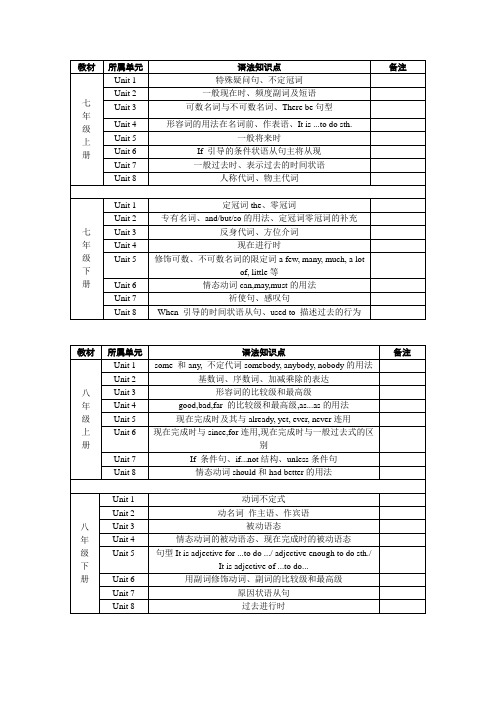
情态动词can,may,must的用法
Unit 7
祈使句、感叹句
Unit 8
When引导的时间状语从句、used to描述过去的行为
教材
所属单元
语法知识点
备注
八
年
级
上
册
Unit 1
some和any,不定代词somebody, anybody, nobody的用法
Unit 2
基数词、序数词、加减乘除的表达
Unit 5
让步状语从句
Unit 6
宾语从句
Unit 7
Who,that, which引导的关系从句
Unit 8
介词的用法形容词后、名词后、动词后
九年级下册
Unit 1
结果状语从句、too...to及enough to的用法
Unit 2
目的状语从句及状语从句的分类复习梳理
Unit 3
The same, different ,like, the same as, different from, the same...as的用法
教材
所属单元
语法知识点
备注
七
年
级
上
册
Unit 1
特殊疑问句、不定冠词
Unit 2
一般现在时、频度副词及短语
Unit 3
可数名词与不可数名词、There be句型
Unit 4
形容词的用法在名词前、作表语、It is ...to do sth.
Unit 5
一般将来时
Unit 6
If引导的条件状语从句主将从现
Unit 8
情态动词should和had better的用法
八
单元语法专题复习(动词-ed作定语、状语和宾语补足语)(解析版)
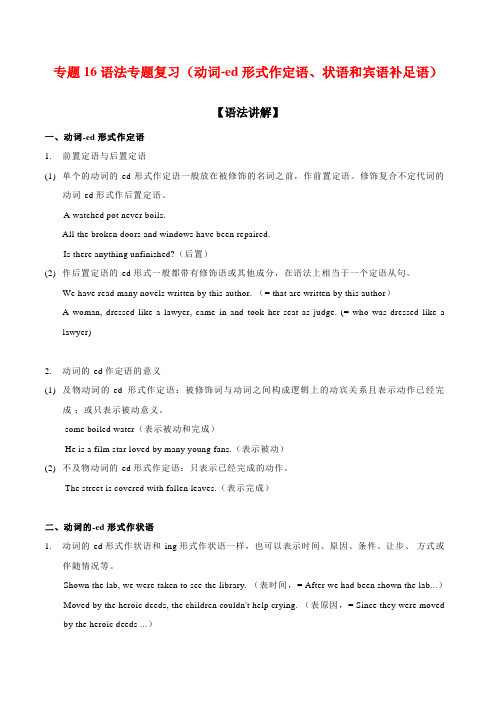
专题16语法专题复习(动词-ed形式作定语、状语和宾语补足语)【语法讲解】一、动词-ed形式作定语1.前置定语与后置定语(1)单个的动词的-ed形式作定语一般放在被修饰的名词之前,作前置定语。
修饰复合不定代词的动词-ed形式作后置定语。
A watched pot never boils.All the broken doors and windows have been repaired.Is there anything unfinished?(后置)(2)作后置定语的-ed形式一般都带有修饰语或其他成分,在语法上相当于一个定语从句。
We have read many novels written by this author. (= that are written by this author)A woman, dressed like a lawyer, came in and took her seat as judge. (= who was dressed like alawyer)2.动词的-ed作定语的意义(1)及物动词的-ed形式作定语:被修饰词与动词之间构成逻辑上的动宾关系且表示动作已经完成;或只表示被动意义。
some boiled water(表示被动和完成)He is a film star loved by many young fans.(表示被动)(2)不及物动词的-ed形式作定语:只表示已经完成的动作。
The street is covered with fallen leaves.(表示完成)二、动词的-ed形式作状语1.动词的-ed形式作状语和-ing形式作状语一样,也可以表示时间、原因、条件、让步、方式或伴随情况等。
Shown the lab, we were taken to see the library. (表时间,= After we had been shown the lab...)Moved by the heroic deeds, the children couldn't help crying. (表原因,= Since they were moved by the heroic deeds ...)Given more time, he would be able to do better. (表条件,= If water is heated...)Laughed at by many people, he continued his research. (表让步,= Even if he was laughed by many people ...)The teacher stood there, surrounded by the students.(表伴随,= and he was surrounded by the students)2.动词-ed形式作状语,可以和连词一起使用。
八年级英语下册1—3单元语法知识复习汇总

Unit1 Will people have robots?一般将来时---表示将要发生的动作或存在的状态。
常与表将来的时间连用,本时态标志词:1.含tomorrow;next week/month/year; in the future; in 2020;2.in+ 一段时间;3.回答howsoon问句;4.祈使句句型中:or/and sb. will do5.在时间/条件状语从句中, 如果从句用一般现在时, 主句用将来时表示将来时的常见句式:1.用bedoing表示将来:主要是表示按计划,安排即将发生的动作,常用于位置移动的动词;如come, go, leave, arrive, fly,move, start等,也可以用其他动词。
如:I'm doing my homework tomorrow.2.be going to 表示近期、眼下就要发生的事情。
如:He is going to write a letter tonight.3.be going to 表示已有迹象表明即将发生的某种情况。
如:Look at the clouds. It's going to rain.4.在有条件从句的主句中,多用will, 如:Be quick, or you will be late.=Ifyou don’t be quick, you will be late.Unit 2 What should I do?情态动词有can(could), may (might), must, have to, shall (should, will (would), dare (dared),need (needed), ought to等。
情态动词无人称和数的变化;不能单独使用,必须与其后的动词原形构成谓语一、 can, could1) 表示能力(体力、知识、技能). eg : Can you lift this heavybox?(体力)此时可用be able to代替。
- 1、下载文档前请自行甄别文档内容的完整性,平台不提供额外的编辑、内容补充、找答案等附加服务。
- 2、"仅部分预览"的文档,不可在线预览部分如存在完整性等问题,可反馈申请退款(可完整预览的文档不适用该条件!)。
- 3、如文档侵犯您的权益,请联系客服反馈,我们会尽快为您处理(人工客服工作时间:9:00-18:30)。
各单元语法复习U 1Vocabulary Check AChoose the appropriate word or phrase from the list to complete the following sentences.1. Wepreconception】of a person from a culture and we interpret his/her behaviour according to this preconception, whether or not the reason for the behaviour is what we think it.2. According to Dr. Helfand, Pakistan built nuclear weapons as a 【deterrent】against India. India wanted them as a 【deterrent】against China.3. The European 【Scrutiny】Committee assesses the legal and/or political importance of each EU document, decides which EU documents are debated, monitors the activities of UK Ministers in the Council, and keeps legal, procedural and institutional developments in the EU under review.4. A major 【stumbling block】in handling criticism is that we believe the criticism to be unfair and untrue and that we should defend ourselves against such criticism.5. Many Americans who are learning Chinese think that the term “Lao Wai”is somehow an insult, and in fact the term “Lao Wai” doesn’t have a negative 【connotation】in Chinese.6. China has no plan to change its 【preferential】treatment policies for foreign investment in the near future in order to reassure foreign investors who have been worried that China might cancel its 【preferential】policies and give foreign investors the same national treatment as their domestic counterparts now that the country is in the WTO.7. Restorative yoga is especially helpful for anxiety-【prone】people because it allows the nervous system to rest and heal.8. Students should develop the ability to weigh evidence without bias, tolerate 【ambiguity】, and use ethical principles in their academic and personal lives.9. Members slated for peacekeeping duties over 180 days are eligible for up to 15 days of rest and 【recuperation】.10. The norms of our own culture are not necessarily wrong-often they are very good-but we should learn not to judge other culture’s ways of acting and thinking 【ethnocentrically】only because they differ from our own.Vocabulary Check BFill in the blanks with the best choice.1.Tenacity implies an active choice to cling to something, not passively being carried along out of inability to imagine anything else.A. TenancyB. TenacityC. TendencyD. Tenure2.In Egypt, I saw the pyramids and the damaged face of the Sphinx, smiling a (an)inscrutable smile. An amazing journey!A. inscrutableB. sweetC. incredulousD. incurious3.The elimination of stereotypes was believed to be a prerequisite for any successful intercultural exchange.A. generalizationsB. judgmentsC. doubtsD. stereotypes4.The Pentagon was planning to launch a 24-hour satellite television channel based in Baghdad to make it easier to circumvent the news media “filter” that Bush Administration officials believe is misleading the public by emphasizing bad news about the occupation of Iraq.A. circumnavigateB.circulateC. circumventD. curriculum5.This class will provide you as a parent with age appropriate songs and activities to enjoy music at home with toddler that will develop coordination, balance and spatial relationship skills as well as communication and cooperation.A. scrutinyB. spaciousC. stereotypeD. spatial6.It is a truism to say that the women who teach in India must know the language, the religion, superstitions and customs of the women to be taught in India. It ought to be the very same case for England.A. truismB. genuineC. tenacityD. similarity7. The connotation of “white”in Chinese includessomething unhappy. At funerals, Chinese pay respect to the dead and express their sorrow by wearing white and writing elegiac couplets in white paper. In the West, however, white is the traditional color for the bride at weddings, and to wear white at funerals would be offensive.A. configurationB. conjunctionC. connotationD. connection8. The just-concluded election in Pakistan is simply afaçade for continuing military rule, according toSelig Harrison, a leading US authority on SouthAsia, Afghanistan and the region.A. inflectionB. façadeC.ambiguityD. fabrication9. As television, and to an extent the internet havepermeated further through our society, the effects are perhaps more significant than even we realize.A. perpetuatedB. pervasiveC.permanent D. permeated10T here’s this new girl coming to my school, and I like her a lot. I want to concrete our friendship before I start a serious relationship.A. cementB. limeC. clayD. concreteU 3Vocabulary Check AChoose the appropriate word or phrase from the list to complete the following sentences.1.ChinaTargeting trendy young people, KFC D&D features new flavors like the 【smoothie 】series, crushed ice of different tastes and hot drinks like Hong Kong-style milk tea. It’s a wider choice of drinks and desserts than those on the regular KFC menu.2.My sister Ellie, who recently lost 20 pounds, has beenpressuring me to lose weight too. And when I asked for a second helping of the low-fat 【casserole】she served for dinner the other night, she totally went off on me.3.Most little children want a dog or a cat, and theycontinually 【pester】their mothers and fathers until they get one. It is only when the sweet little thing has been brought home that the parents realize how much time and money must be spent on “Rover” or “Bonze”.4.Nigerian President Obasanjo said Sunday that he isnot excluding 【sabotage】as the cause of last Sunday’s bomb explosions at the Military Cantonment in Lagos, which led to the death of more than 1,100 people.5.An obviously biased judge made derisive decisionsthroughout the trial. The strain of the trial also placed Barrie’s marriage under 【duress】, which ultimately led to his wife divorcing him, and led to Barrie’s children being derided and physically attacked by their classmates.6.The G.O.P. hopes to gain votes by attacking her as aradical feminist who prefers the boardroom to the kitchen. But the ploy could 【backfire】by alienating working women.7.B oth Luo and Guang admit their drugs, whileeffective in combating AIDS and alleviating its syndromes, may not be the final answer to solving the AIDS crisis. Rather, they believe, combined 【therapy】is the likely ultimate answer. Luo said his drugs, when combined with Western medicine, such as the AZT, have shown double the effectiveness for treating AIDS patients.8.This 【delectable 】TV programme is suitable forthose half-educated people.9.“John has no 【siblings】. So when his parents passedaway, he inherited everything from the family-properties, bank savings, stocks and a big house. He’s really living on easy street.”10.Anthropologist Dr. Edward T. Hall points out that,for two unacquainted adult male North Americans, the comfortable distance to stand for private conversation is from arm’s length to about four feet apart. For as the South American moves in, the North American feels he’s being pushy; and as the North American backs off the South American thinks he’s being 【standoffish】Vocabulary Check BFill in the blanks with the best choice.1. There was so much pain there, inadvertently causedb y both sides over the years. I didn’t want to hurt them, nor they me, but the harm had been done and it was irreversible.A. inappreciablyB. inadvertentlyC. inarticulatelyD. invisibly2. Strengthening regional economic cooperation is a top priority for many Asian countries. Interdependence among these different countries is becoming stronger - thanks to the adoption of a more open economic model. And now, Asian countries are making efforts to promote regional_ integration, and in turn realize common prosperity.A. integrationB. diversityC. competitionD. integral3. When people can’t explain a new phenomenon using their knowledge, they will firstly try to understand the new phenomena using the logic reference of_ analogy.A. comparisonB. analysisC. counterpartD. analogy4. If you mess up, it’s not your parents’ fault, so don’t whine about your mistakes, learn from them.A. wonderB. worriedC. whineD. pester5. The system was redesigned to embrace the network and eventually steer it in a profitable direction.A. adaptB. controlC. installD. steer6. The introduction of gunpowder gradually made the bow and arrow obsolete, particularly in western Europe.A. obscureB. obsoleteC. optionalD. overlapping7. From busy homemakers to professional people, many Americans enjoy the convenience of prepackaged meals that can be ready to serve in 10 minutes or less. On the other hand, many Americans recognize the value of culinary art.A. cookieB. culinaryC. cuisineD. cook8. The chairman of the board pressed on me the unpleasant job of dismissing good workers the firm can no longer afford to employ.A. compelledB. posedC. pressedD. tempted9. I am not compatible with my roommate but I have to share the room with her, because I have nowhere else to live.A. concernedB. compatibleC. considerateD. complied10.A good education should train students to think for themselves. However, most of them are trained in the technique of examination under duress.A. dulyB. dutyC. duressD. obligationU 4Vocabulary Check AChoose the appropriate word or phrase from the list to complete the following sentences. Remember to change the form if necessary.warranted】.2.The progress of studies comes from hard work and is 【retarded】by frivolities.3.Unfortunately, what the farmers had gained in the autumn harvest was 【offset】by the heavy losses caused by a snowstorm in the winter.4. The renewing of the 【infrastructure】needs greaterfiscal investments from the government.5.The【vestige】of plan economy is being erased step by step.6.The newcomer has gradually learned what is【entailed】in the position as a qualified salesperson.7. The disagreements in the nuclear negotiation are【symptomatic】of the tensions between America and Iran.8.The policy by EU that imposes serious constraints on textile imports from China will definitly【thwart】the bilateral trade in other areas.9.The Labour Party under Tony Blair won a(n)【aggregate】number of 356 seats in the presidential election.10.Policy makers and economists shoulder the responsibility of【optimizing】the use of resources. Vocabulary Check BChoose the appropriate word from the list to complete the following paragraph. Remember to change the form if necessary.The true rate of (1) returnhigh as 30% or 40%. Our knowledge of true return to education is currently very (2)limited as is our knowledge of the true rate of return to physical capital. More studies on rigorous data are (3)warranted. A more factually informed knowledge base will improve government decision making. If governments (4) evaluate projects, whether they are human capital projects, or investment projects for dams, road, bridges or factories, they will make better investment decisions. Project evaluations play an important role in keeping good investments and promoting good projects and (5) eliminating the bad. The value of factually informed cost-benefit econometrics is extraordinarily high. Cost-benefit studies produce value for local governments, provincial government and central government. Research that creates and collects much richer data sets on the returns to all kinds of human and physical capital to guide policy formation will improve policy making. Creating incentives and developing capital markets would promote investment in human capital. It is not necessary to use funds from the center or (6)presume that education and skill formation should be governmentally supplied. Free up the labor market and the market for education would (7) harnessthe forces that promote acquisition of skills by (8) fostering the training of individual workers by firm, or encourage individuals to train themselves in the workplace to be better farmers, better factory workers and better managers. Otherwise, educational (9)_ expenditures should be increased and equalized across regions to (10) maximize the return on human capital investment. U 5 Vocabulary Check A Choose the appropriate word or phrase from the list to complete the following sentences. 1. Even theCongress to hold down other spending or dip into funds 【earmark 】 for Social Security. 2. Since Pain was paying no attention to him, he decided that he might without 【 impropriety 】 ignore Pain. 3. The choice of household and industrial waste disposal is between tipping and 【incineration 】. 4. Operation Rescue was an organization notorious for its confrontational tactics and its implacable opposition to 【abortion 】 under all circumstances. 5. Since then we have had 【cyclone 】, wars, floods, so many things to add and subtract. 6. Coconuts are being scraped and the juice is squeezed on pounded taro or 【cassava 】 for puddings. 7. The psychological advantages or disadvantages on woman and 【fetus 】must be addressed and researched so that informed decisions can still be made. 8. Not all cultural practices are as extreme and the character of the ground flora will also depend on the land-use prior to 【afforestation 】. 9. The firm pledges its inventory as 【collatera l 】 for a short-term loan, but the lender has no physical control over the inventory. 10. There is no apparent conclusive scientific study, but the 【anecdotal 】 evidence is strong that the herb is useful. Vocabulary Check B 1. The decision to opt for sewage composting was made largely in order to reduce the need for water for flushing the toilet. A. sew B. sewerage C. sewage D. sewn 2. The end product of such a course of evolution is anobligate parasite that is inextricably linked to a particular host.A. paradiseB. parasiticC. parasiteD. parasite3. The situation for teachers without tenure varies according to the circumstances surrounding the dismissal.A. tenureB. tentC. tendencyD. tenured4. Garth doesn’t work; he just lives off his inheritance.A. inheritorB. inherentC. inheritD. inheritance5. It causes many complications, including small placenta size, stillbirth and low birth weight.. A. stillborn B. stillbirth C. stilllife D. stillwater6. The market will undervalue goods that yield social benefits in excess of private benefits and will consequently produce too few of these goods.A. undervalueB. devalueC. underweightD. value7. The alert library media specialist will have recognized at once that mainstreaming is, after all, a kind of integration.A. majorityB. maintenanceC. mainstreamingD. mainframe8. The new decoder uses an amplitude locked-in combination with a phase locked loop to achieve this breakthrough.A. looseB. loopholeC. loomD. loop9. Geometrically, the inner product of two vectors can be considered a measure of their similarity.A. carriersB. vectorsC. agentsD. mediums10. They include a new way of controlling waterborne diseases, and of administering drugs to people with chronic diseases.A. waterborneB. water-sickC. waterbedD. water cureU 7Vocabulary Check AChoose the appropriate word from the list to complete the following sentences.1. The distance was not great enough to 【obliterate】details, it only made them little, and mellow, and dainty, like landscapes and towns seen through the wrong end ofa spy-glass.2. The water, however, will 【encroach】little by little onthe shore, the island becoming lower and smaller, and the space between the inner edge of the reef and the beach proportionately broader.3. To 【remit】the punishment of such crimes was, he said, to encourage them.4.Elizabeth also wept and was unhappy, but hers also was the misery of innocence, which, like a cloud that passes over the fair moon, for a while hides but cannot 【tarnish】its brightness.5. When Ajax saw his mark he knew it and was glad; he threw it to the ground and said, "My friends, the lot is mine, and I rejoice, for I shall【vanquish】Hector.6. “Now, it is of no use, Peak,” said Sir John, raising his hand in 【deprecation】of his delivering any message; “I am not at home.”7. In submarine works, the workman, clad in an【impervious】dress, with his head in a metal helmet, receives air from above by means of forcing pumps and regulators.8. Large 【valances】of silk, embroidered with flowers of gay colors, which were rather faded, fell from the wide windows; the fittings of the room were simple, but in excellent taste9. Perhaps had one been there to point them out to us, we might have noted 【indentations】in the mud, but they were countless, one overlapping another into a confusion that would have been entirely meaningless to us.10. Their arms were rather longer and their legs shorter in proportion to the torso than in man, and later I noticed that their great toes protruded at right angles from their feet—because of their arboreal habits, I presume.Vocabulary Check BFill in the blanks with the best choice.1. The sea laughed and flashed and preened and allured, like a beautiful, coquettish woman.A. coquettishB. vulnerableC. weirdD. shrewd2. He has done me no harm, poor wrench, but he is an eyesore to me now, for he is Driscoll, the young gentleman, and I am a—oh, I wish I was dead.A. eyelashB. eyewitnessC. eyesoreD. eye-opener3. Does any secret repugnance, or any hereditary dislike, exist between you and her family?A. hystericalB. hereditaryC. incredibleD. incredulous4. And so the sailors fled into the stern and crowded bemused about the right-minded helmsman, untilsuddenly the lion sprang upon the master and seized him; and when the sailors saw it they leapt out overboard one and all into the bright sea, escaping from a miserable fate, and were changed into dolphins.A. amusedB. amazedC. bemusedD. obsessed5. There must be some good reasons for these dispensations of fate, but I have never sought to discover them.A. discrepanciesB. discriminationsC. dispatchesD. dispensations6. The rifle hanging upon the wall caught his first attention; it was for this strange, death-dealing thunder-stick that he had yearned for months; but now that it was within his grasp he scarcely had the temerity to seize itA. temerityB. condolenceC. tenacityD. conspiracy7. And here, instead of its being a matter of_ condolence,it turns out to be one of congratulationA. meditationB. condolenceC. relevanceD. sensation8. Upon this, Jones began to beg earnestly to be let into this secret, and faithfully promised not to divulge it.A. divulgeB. dispenseC. dissolveD. disperse9. Consider that the poison was so virulent that even a man who is as strong as an ox like Malone here, could hardly get up the stairs before he fell unconscious.A. viciousB. villainousC. virulentD. vehement10. Anne was sitting at her open window, for the time forgetful of the woes of examinations and the cares of the world, as she drank in the beauty of the summer dusk, sweet-scented with flower breaths from the garden below and sibilant and rustling from the stir of poplars.A. thrillingB. shimmeringC. thunderingD. sibilant。
